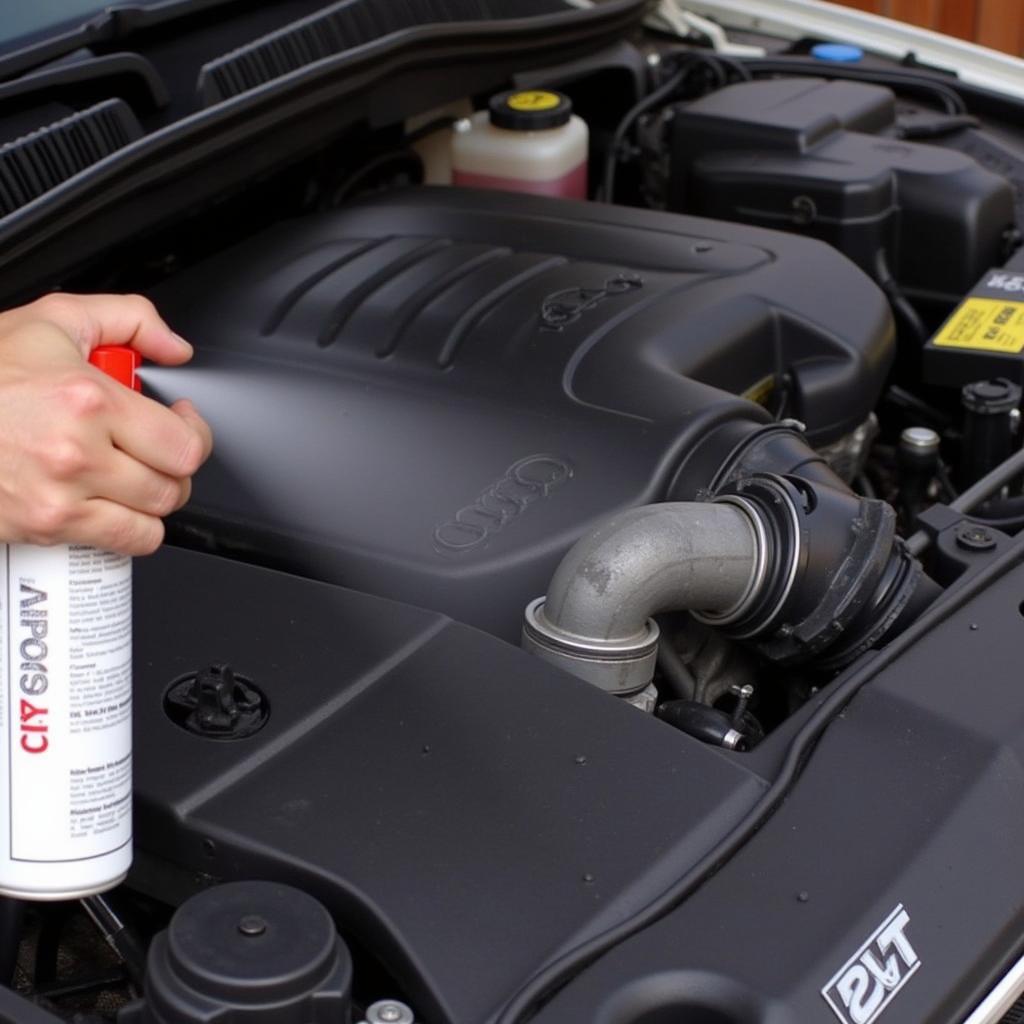Your cart is currently empty!

Decoding Audi TT 1.8T Engine Codes: A Comprehensive Guide
Understanding your Audi TT 1.8T engine codes is crucial for effective troubleshooting and maintenance. Whether you’re a DIY enthusiast or a seasoned mechanic, this guide will equip you with the knowledge to diagnose and address those pesky engine codes that can plague your driving experience. We’ll delve into the common codes, their potential causes, and solutions, empowering you to keep your Audi TT 1.8T running smoothly.
Common Audi TT 1.8T Engine Codes and Their Meanings
The Audi TT 1.8T, a popular sports car, is known for its performance and sleek design. However, like any vehicle, it can experience engine issues indicated by specific diagnostic trouble codes (DTCs). These codes are essential clues for understanding what’s happening under the hood. Let’s examine some of the most frequent offenders.
P0171 and P0174: Fuel Mixture Problems
These codes often appear together and signal a lean fuel mixture, meaning there’s too much air and not enough fuel. This can be caused by a variety of issues, from a faulty MAF sensor (Mass Air Flow) to vacuum leaks or a failing fuel pump. Diagnosing the root cause requires a systematic approach.
-
Check for Vacuum Leaks: A simple way to check for vacuum leaks is to spray carb cleaner around potential leak points while the engine is idling. A change in engine speed indicates a leak.
-
Inspect the MAF Sensor: A dirty or faulty MAF sensor can mislead the engine control unit (ECU) about the amount of air entering the engine. Cleaning or replacing the sensor may resolve the issue.
-
Fuel Pressure Test: A fuel pressure test can determine if the fuel pump is delivering adequate fuel pressure.
 Checking Vacuum Leaks on Audi TT 1.8T Engine
Checking Vacuum Leaks on Audi TT 1.8T Engine
P0300: Random/Multiple Cylinder Misfire
This dreaded code indicates a misfire in one or more cylinders, often resulting in rough idling, reduced power, and poor fuel economy. Potential culprits include faulty spark plugs, ignition coils, or fuel injectors.
-
Inspect Spark Plugs: Check the spark plugs for wear, fouling, or damage. Replace them as needed, ensuring they are gapped correctly.
-
Test Ignition Coils: A simple test involves swapping ignition coils between cylinders. If the misfire follows the coil, the coil is faulty.
-
Check Fuel Injectors: A leaking or clogged fuel injector can also cause misfires. They can be tested for resistance and spray pattern.
P0400: Exhaust Gas Recirculation (EGR) Flow Malfunction
This code suggests a problem with the EGR system, which is designed to reduce emissions. A faulty EGR valve or clogged EGR passages can trigger this code.
-
Check EGR Valve Operation: The EGR valve can be tested using a vacuum pump or a scan tool to verify its movement.
-
Clean EGR Passages: Carbon buildup can clog the EGR passages, hindering flow. Cleaning these passages can often resolve the issue.
Using Audi TT 1.8T Engine Codes for Effective Troubleshooting
Understanding the meaning of the codes is just the first step. Effective troubleshooting requires a systematic approach:
-
Retrieve the Codes: Use an OBD-II scanner to read the engine codes.
-
Research the Codes: Consult reputable sources like this guide or factory service manuals for detailed information on each code.
-
Diagnose the Issue: Perform the recommended tests and inspections to pinpoint the root cause.
-
Repair or Replace: Once the problem is identified, repair or replace the faulty component.
-
Clear the Codes: After repairs, clear the codes using an OBD-II scanner.
“Don’t just throw parts at the problem. A methodical diagnostic approach will save you time and money in the long run,” advises Johnathan Miller, a seasoned automotive technician with over 20 years of experience.
What are the most common Audi TT 1.8T engine codes?
Some common codes include P0171 and P0174 (fuel mixture), P0300 (misfire), and P0400 (EGR).
How do I fix an Audi TT 1.8T engine code?
Fixing a code involves diagnosing the underlying cause and repairing or replacing the faulty component.
Can I drive my Audi TT 1.8T with an engine code?
While sometimes possible, it’s best to address engine codes promptly to prevent further damage. “Ignoring a check engine light can lead to more serious and costly repairs down the road,” warns Samantha Davis, a certified automotive instructor.
In conclusion, understanding Audi TT 1.8T engine codes is a powerful tool for any owner or technician. By using this guide as a resource, you can effectively diagnose and resolve engine issues, keeping your Audi TT 1.8T performing at its best. Contact VCDSTool at +1 (641) 206-8880 and our email address: vcdstool@gmail.com or visit our office at 6719 W 70th Ave, Arvada, CO 80003, USA for expert assistance with your Audi TT 1.8T.
FAQ
-
What does the P0171 code mean on an Audi TT 1.8T? It typically signifies a lean fuel mixture.
-
What causes a P0300 code? Faulty spark plugs, ignition coils, or fuel injectors are common causes.
-
How do I check for vacuum leaks? Use carb cleaner sprayed around potential leak points.
-
Is it safe to drive with a P0400 code? While sometimes possible, it’s best to address it promptly.
-
How do I clear engine codes? Use an OBD-II scanner.
-
Where can I find more information on Audi TT 1.8T engine codes? Factory service manuals and online forums can be helpful resources.
-
What is the best way to prevent future engine codes? Regular maintenance, including timely tune-ups and inspections, is key.
by
Tags:
Leave a Reply